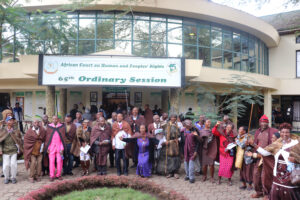
On June 23rd, the African Court on Human and Peoples’ Rights ruled that the Kenyan government must grant the Ogiek people collective land title to the Mau forest and pay them $1.3 million as compensation for historical injustices. This is a landmark victory for the Ogiek who have been suffering continuous evictions from their ancestral territories.
The Mau forest, in south-western Kenya, has been home to the Indigenous Ogiek people since time immemorial. The Ogiek, who depend on hunting, gathering, and small-scale farming for their livelihoods, have faced countless evictions from their ancestral homelands since the beginning of British colonial rule. Throughout the last century, the reasons for evictions have been multiple, such as industrial agriculture and logging, but the most recent cases have been about the Kenyan government blaming the Ogiek for deforestation and ecosystem degradation.
In 2009, following another eviction order from the Kenya Forest Service, the Ogiek brought a case to the African Commission on Human and Peoples’ Rights which was later taken to the African Court. Finally, in 2017, the Court ruled that the Mau forest is the ancestral home of the Ogiek; that the Government of Kenya had violated the rights of the Indigenous people to their lands; and that their evictions have not supported protecting the forests. However, rather than implementing the Court’s decision, the Kenyan government has continued violating the Ogiek’s rights. In July 2020, for example, more than 100 Ogiek families were violently evicted and 300 Ogiek infrastructures destroyed in the Mau forest.
The government’s failure in implementing the decision from 2017 led to a further judgment by the same court last week. This time, the African Court ruled that the Kenyan government must pay 158 million Kenyan shillings ($1,3 million) to the Ogiek people for material and moral damages. This was the first time that the Court has called for compensation for an Indigenous community. The Court further stated that:
· The government must take all necessary measures to identify, delimit and grant collective land title to the Ogiek community and, by law, assure them of unhindered use and enjoyment of their land.
· The government must recognize, respect, protect and consult the Ogiek in accordance with their traditions and customs, on all matters concerning development, conservation or investment on their lands.
“The judgment is a big relief to the Ogiek community. We have been in and out of courts and it has been costly for us. The next step after the landmark is for the government of Kenya to move in and start implementing the ruling of the African Court by consulting us, the Ogiek community.” – Daniel Kobei, Ogiek Peoples’ Development Program (OPDP)
Land is Life celebrates this landmark victory with the Ogiek people and demands the Kenyan government to fulfill the obligations set in the ruling. We hope that the case will set a powerful precedent in Africa where various Indigenous peoples, such as the Batwa and the Maasai are continuously suffering forced evictions from their territories.
The 13-year-long court process is one of the many tools that the Ogiek have used for fighting for their rights to their lands. Another relevant tool has been the ongoing process of developing an autonomous, Ogiek-led Free, Prior, and Informed Consent (FPIC) Protocol that aims to support the communities in responding to increasing land use pressures from their own governance mechanisms and worldviews.
Comentarios
Una respuesta a «Land is Life Celebrates the Landmark Victory of the Ogiek People in the African Court»
[…] a la que pertenece Judi Nagol, asentada en el emblemático bosque keniano Mau Forest, recibió una sentencia favorable de la Corte Africana. Sentencia que obliga al Gobierno del país a reparar a este comunidad por las injusticias […]